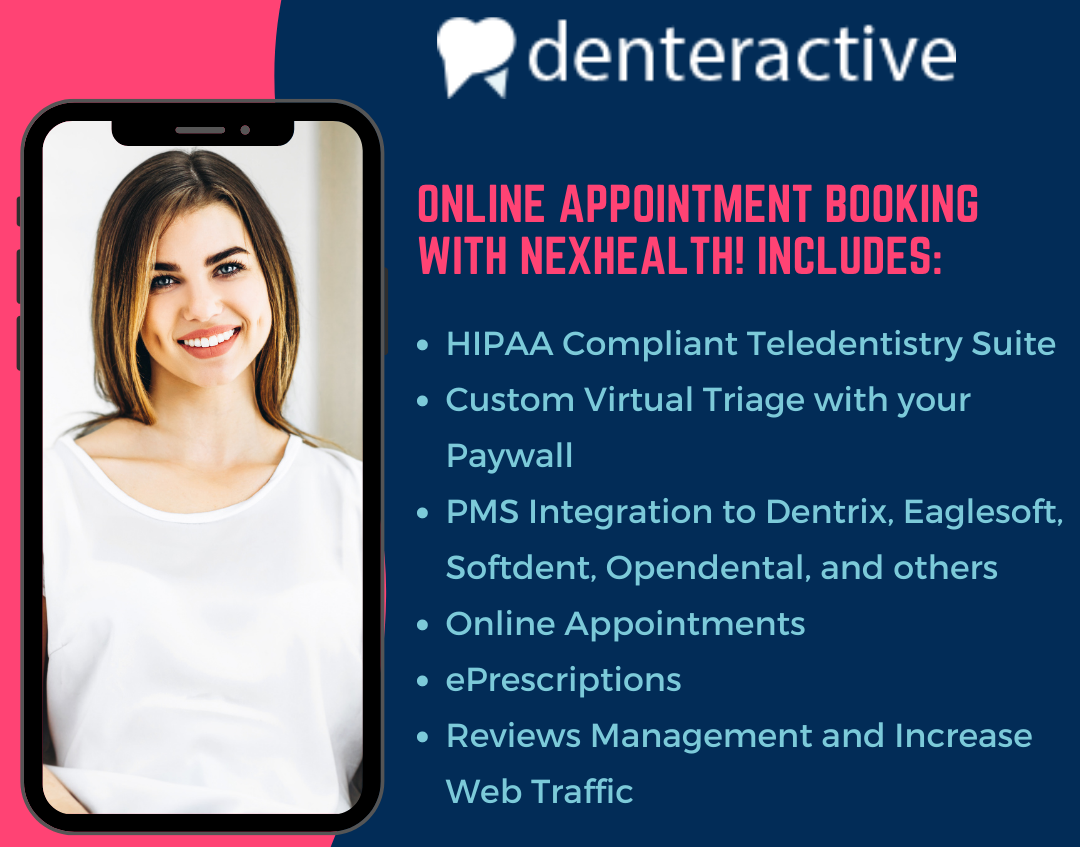Training Your Dental Practice Team Members How to Schedule Patients

Scheduling patients has always been tricky given the diverse needs of patients and the time it takes to deliver high-quality treatment. One patient may require a mere 20 minutes of a dentist’s time where another might require 60 minutes or more. With COVID-19 and social distancing concerns still ebbing and flowing, dental teams have even more scheduling challenges to contend with. Software, like Denteractive and partner NexHealth, can optimize online and overall scheduling for your practice, while keeping your office organized, such as by setting auto reminders and offering other helpful communication methods for your patients. In this article, we’ll explore some general tips with how you can train your dental team to schedule patients to suit your practice schedule while accommodating patients’ needs too.
Prioritize Good Communication Skills and Excellent Customer Service
No matter how caring and empathetic you and other dentists on your team are, your administrative staff is often the first impression patients have of your office. Knowing that you prefer to perform complex procedures in the morning is important for schedule training, but so is the need for consistent kindness and competent communication from your scheduling staff. Your support staff, whether they realize it or not, are brand ambassadors for your practice.
While it is not always possible to accommodate patients’ scheduling needs, it is always possible to demonstrate kindness and empathy to patients. Dental and medical patients can attest that not all practices treat their patients as well as they should. To retain your patients and ensure that they have a positive experience with your practice, be adamant in your expectations for friendly behavior at all levels. Encourage your staff to be honest with patients about scheduling constraints. Good customer service, in this regard, supports patients’ expectations that they are going to receive good patient care when they visit.
Use Block Scheduling
Many dental practices use block scheduling to meet their patient quotas while providing enough time to serve the needs of patients. It is ideal to schedule the most complex procedures early in the day. These are the procedures that tend to take the longest amount of time to perform. Color coding the blocks allows staff to easily see what blocks are flagged with priority procedures. Time blocks that are colored red are often designated for the most urgent cases. More routine procedures may be added to green or yellow blocks.
Set Aside Extra Time in Each Day
As a dentist knows, patient emergencies happen. How is your practice prepared to accommodate emergency dental situations? Many practices block extra time each day. This time gives dentists a buffer between procedures that may take longer than planned. During this time, dentists can see patients who need emergency dental care or take care of other needs. Building flexibility in the daily schedule may not seem easy at first, but once the team gets back into the routine of seeing a full slate of patients, it is likely to get easier to schedule based on the team’s familiarity with the different types of procedures.
Move to 10-Minute Units
Some dentists still use 15-minute units when scheduling. That extra five minutes per appointment translates to lost income. By moving to 10-minute units, staff can schedule more patients, many of whom will not require more than 10 minutes of the dentist’s time because they are being served by the hygienist or another dental technician. With more patients clamoring to see their dentist for the routine care they put off because of COVID-19, it makes sense for dentists to move to the 10-minute interval if it works for your dental practice.
Perform Routine Time Studies
To make the most of your time, you need to be aware of the time it takes you and your dental assistants to perform procedures. Start with your high-production procedures. Then determine the average time to perform this procedure. Include preparation time and anesthesia. When you have these average times, you can make more realistic scheduling decisions. That not only benefits your practice, but also your patients.
Reduce Missed Appointments
It is certainly not your staff’s fault when patients miss their appointments, but it helps to train your staff to provide patients with appointment reminders, utilizing tools from Denteractive partner NexHealth. Missed appointments are missed opportunities for income.
By auto sending reminders out a few days before the appointment (Denteractive partner NexHealth does this) by email or text, you may be able to encourage patients to confirm or to reschedule; if they need to reschedule, your team may be able to quickly fill those appointments with on standby patients hoping to see a dentist sooner than the current schedule permits.
Remember, too, that many patients are still nervous about COVID-19. Train your staff to alleviate their fears by explaining your office precautions. Dental practices such as yours may be requesting patients to remain in their cars until their appointment rather than sitting in the waiting room.
Finally, be clear about your cancellation and no-show policy. If you intend to bill clients who fail to show up for their scheduled appointments, you should alert them when they schedule their appointment. It is important to train staff to remind patients of their cancellation and no-show policies. You can also send this policy to patients when you send your appointment reminder.
Rely on Support Staff
Today, your dental practice may rely on hygienists and dental assistants. When scheduling, it is important to take into consideration the entire team’s abilities. Their work can reduce the amount of time a dentist has to spend with patients who are coming in for certain procedures such as teeth cleanings. It is important that the scheduling team is aware of the procedures that other staff perform so they can schedule them and dentists more effectively.
Comprehensive scheduling training helps you ensure that your staff can competently manage this crucial aspect of your practice. The more efficient the scheduling, the smoother each day is apt to go. Poor scheduling reduces the efficiency of the practice and displeases patients. With effective training, your team will be able to schedule patients in a manner that supports the success of your practice while ensuring that their dental care needs are met.
We aim to solve your scheduling issues with Denteractive Partner NexHealth. See our pricing options and get started without a credit card!



